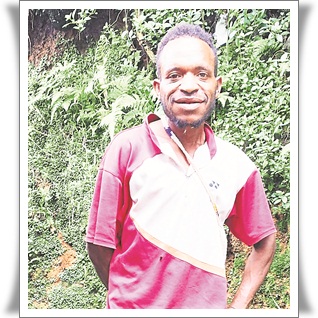
Nana sews seat covers for a living
By PETER WARI
NANA Locke had to cut short his education when he reached Grade Two because of tribal wards in his Kagua-Erave district in Southern Highlands.
“Because of the unwise decisions by leaders to start tribal fights, dozens of youths like me find it hard to be educated and secure a good future. Warring tribes end up losing something in the end and no one is a winner. There was no peace and young people cannot use their land.”
Nana is the third eldest in a family of eight. His two youngest siblings are still at school while the others are subsistence farmers.
In 2010, he decided to leave his Uma village to find a job in Mt Hagen, like what some of his peers were doing.
“I sew covers for vehicles. In the morning I take my finished products to be sold. At midday, I go back to secondhand shops to buy more materials and sew more seats.”

Nana, then 18, was forced to leave his family behind in the village to look for job opportunities in town, although he knew his education level did not put him in good stead.
“I moved around from house to house of wantok in Mt Hagen. Some welcomed me and gave me food and shelter while others saw me as a burden.”
One relative eventually offered him shelter and Nana started work as a bus checker, travelling between Mt Hagen and Kagamuga airport.
Sometimes bus owners scold him for not making enough money. And there were regular fights between checkers over passengers.
“One time, I had a fight with another bus crew. As a result, I was not paid properly. I had bruises on my face, just to make money for someone. I planned to look for another job.”
He noticed bus owners always complaining about the damaged seat covers in their buses and planned to start a small business fixing damaged bus seat covers.
“I planned to sew quality seat covers.”
He borrowed a hand sewing machine and started learning how to sew. He tried several times before he mastered the skill of fixing seat covers.
He bought hardcover materials from secondhand clothing shops, sew them and sold them to bus owners.
“I make about K150 a day. I recalled my previous work working in a bus yelling, fighting for passengers all for K150 to K200 a fortnight.”
He made about K700 in a week and bought a new sewing machine for K450. He also rented a small room near the city to live in and run his business.
“I sew covers for vehicles. In the morning I take my finished products to be sold. At midday, I go back to secondhand shops to buy more materials and sew more seats.”
He loves to help loved ones admitted at the Mt Hagen Provincial Hospital.
“Helping our loved ones while they are still alive is the right thing to do instead of spending money when they are dead. They are gone and won’t be there to appreciate your help.”
He is today living a happy life while competing with others doing the same business of selling seat covers.
He thanks God for his guidance and protection and the blessing that had sustain his livelihood.
His advice to village elders and leaders is to provide young people the opportunity to do something useful in the rural areas so that they do not leave for urban centers and end up on the streets.
His advice to young people involved in criminal activities is to stop waiting for the government to create jobs for them.
“Try out something to earn a living using your God-given brains.”